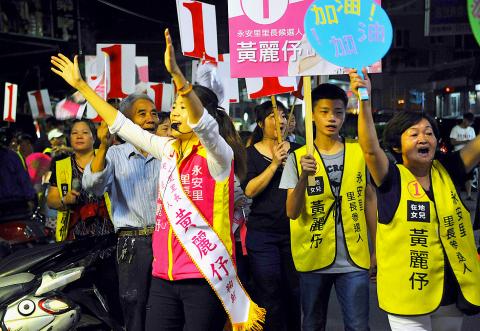Dora Chou (周楷茵) is often told that she doesn’t look like a borough warden (里長).
The 29-year-old candidate for Beitou District’s Hot Springs Borough (溫泉) certainly doesn’t look the part — 86 percent of borough wardens in Taiwan are male, with an average age of 61.5.
As a self-described “distant person” who doesn’t warm up to people easily, Chou further deviates from the traditional image of the sociable, friendly and respected patriarch or matriarch who looks after the community. With limited resources and little backing, Chou mostly campaigns alone, but she prefers it that way, saying that she would rather take time to explain her goals to each constituent and understand their needs instead of the usual boisterous canvassing techniques.

Photo: Han Cheung, Taipei Times
“I don’t like to shake hands with people just to ask them to vote for me. This is a democratic process, and elections are not a popularity contest,” she says, adding that she feels that aggressive canvassing is bothersome to the residents.
Across town in New Taipei City’s Sanchong District (三重), Yongan Borough (永安) warden hopeful Huang Li-yu (黃麗伃) is out shaking hands the traditional way, shouting “Give young people a chance!” through a megaphone. But the 27-year-old’s official campaign promises are written in a lively, detailed style that reflects her youth and energetic personality, and includes trendy community building ideas such as recording and promoting the area’s little-known history.

Photo: Han Cheung, Taipei Times
Due to their age and gender, both Chou and Huang have heard their share of disparaging remarks while campaigning. Both alumni of the female borough warden training program put on by the National Alliance of Taiwan Women’s Associations (台灣婦女團體全國聯合會) this summer, the two are part of the association’s push to get more women into neighborhood-level politics.
YOUTH CAMPAIGN
Lin Ching-lin (林京玲), who was elected in 2014 at age 24 as warden of Taichung’s Gongmin Borough (公民), says stereotypes about women make it difficult to be elected to these positions. In her borough’s case, it was because the same family had produced the warden for more than the past 80 years.
Lin says she was elected in the wake of the 2014 Sunflower student movement (太陽花學運) protests at the legislature, which generated considerable political participation by the nation’s youth.
Neither Chou or Huang face the typical elderly male incumbent. Chou is running against 37-year-old Hsu Chih-chuan (許智全), who 12 years ago became the nation’s youngest borough. Women have been elected as the warden of Yongan Borough for the past 16 years, and Huang faces 59-year-old Huang Ling-yu (黃菱鈺), who took over in the last election after the long-serving warden stepped down.
Unlike Chou, Huang Li-yu’s family is one of the largest and oldest in her area, providing her with ample support. However, Huang Li-yu says that as a young person, she is able to perform most of the arduous canvassing tasks personally instead of sending her volunteers to climb stairs and knock on doors. She also runs a Facebook page she set up for the borough and designed all her promotional material. Huang Ling-yu, the incumbent, barely has an Internet presence. When Huang Li-yu cycles around the community, her stereo blares an original Hoklo (also known as Taiwanese) rap song about why she should be warden.
Chou is low key by comparison. She didn’t have a campaign headquarters until a local dentist let her use one of his clinics. She livestreamed her campaign promises on Facebook the day after she registered to run, and has partnered with Taipei City Council candidate Wang Yi-kai (王奕凱), a 33-year-old former Sunflower activist who has an active interest in community building and other social issues. She has appeared with him on many advertisements and several political television shows, and at events.
“I just don’t feel comfortable walking into a market and pretending that I’m buddies with everyone so they’ll vote for me,” Chou says, insisting on doing things her way even though countless people have told her she doesn’t know how to campaign. She says actions are more powerful than words, and has already helped the neighborhood set up regular communal meals and organized a well-attended Halloween event.
INNOVATIVE POLICIES
Chou and Huang Li-yu also have innovative campaign promises.
Hsu’s list has more traditional items such as converting old dormitories into parks, parking lots and activity centers, merging local school districts and moving electrical wires underground. Only one item is related to community building: “To host regular festivities and events to improve relations between community members.”
Chou says about 30 to 40 percent of her promises entail increasing democratic participation. For example, instead of appointing neighborhood chiefs (鄰長), she wants people to elect them, and hopes to increase local participation by holding borough meetings where residents can have a say in where funds are going.
She will also encourage borough residents to participate in affairs beyond the borough, especially the construction and development of Beitou as a tourist hotspot.
Chou promises to organize sports and video game teams, promote English classes so that residents can communicate with tourists and find ways to treat hot spring wastewater.
Huang Li-yu shares some ideas with Huang Ling-yu, but hers are more concrete. For example, the incumbent lists “finding more avenues for constituents to receive free legal advice,” while Huang Li-yu writes that she will form a team of young professionals who will provide legal advice regarding employment, retirement and accidents, as well as teach older constituents how to use electronic devices.
Chou and Huang Li-yu may bring fresh ideas to the table, but their real test begins once they are elected. Lin says that unproven newcomers and atypical candidates need to work especially harder.
“People are willing to give young people a chance in the beginning. But they’ll also be hard on you because they want to see if you can really do the job,” she says.

May 18 to May 24 Pastor Yang Hsu’s (楊煦) congregation was shocked upon seeing the land he chose to build his orphanage. It was surrounded by mountains on three sides, and the only way to access it was to cross a river by foot. The soil was poor due to runoff, and large rocks strewn across the plot prevented much from growing. In addition, there was no running water or electricity. But it was all Yang could afford. He and his Indigenous Atayal wife Lin Feng-ying (林鳳英) had already been caring for 24 orphans in their home, and they were in

On May 2, Chinese Nationalist Party (KMT) Chairman Eric Chu (朱立倫), at a meeting in support of Taipei city councilors at party headquarters, compared President William Lai (賴清德) to Hitler. Chu claimed that unlike any other democracy worldwide in history, no other leader was rooting out opposing parties like Lai and the Democratic Progressive Party (DPP). That his statements are wildly inaccurate was not the point. It was a rallying cry, not a history lesson. This was intentional to provoke the international diplomatic community into a response, which was promptly provided. Both the German and Israeli offices issued statements on Facebook

President William Lai (賴清德) yesterday delivered an address marking the first anniversary of his presidency. In the speech, Lai affirmed Taiwan’s global role in technology, trade and security. He announced economic and national security initiatives, and emphasized democratic values and cross-party cooperation. The following is the full text of his speech: Yesterday, outside of Beida Elementary School in New Taipei City’s Sanxia District (三峽), there was a major traffic accident that, sadly, claimed several lives and resulted in multiple injuries. The Executive Yuan immediately formed a task force, and last night I personally visited the victims in hospital. Central government agencies and the

Australia’s ABC last week published a piece on the recall campaign. The article emphasized the divisions in Taiwanese society and blamed the recall for worsening them. It quotes a supporter of the Taiwan People’s Party (TPP) as saying “I’m 43 years old, born and raised here, and I’ve never seen the country this divided in my entire life.” Apparently, as an adult, she slept through the post-election violence in 2000 and 2004 by the Chinese Nationalist Party (KMT), the veiled coup threats by the military when Chen Shui-bian (陳水扁) became president, the 2006 Red Shirt protests against him ginned up by